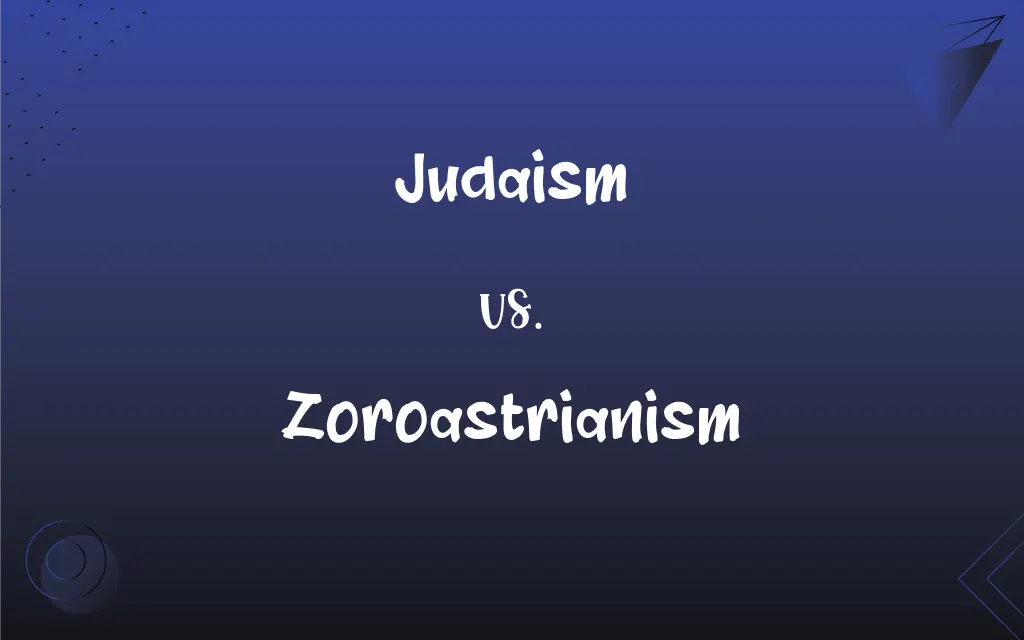Judaism vs. Zoroastrianism: What's the Difference?
Edited by Aimie Carlson || By Janet White || Published on March 4, 2024
Judaism is a monotheistic religion centered on the covenant between God and the Israelites, while Zoroastrianism is one of the world's oldest monotheistic religions, focusing on the dualistic cosmology of good and evil.

Key Differences
Judaism is an ancient monotheistic religion with beliefs and practices rooted in the Hebrew Bible, emphasizing the covenant between God and the Jewish people. It focuses on the worship of one God and adherence to the Torah as the guide for moral and religious life. Judaism has a rich tradition of law, ethics, and ritual practices, including the observance of the Sabbath and dietary laws. Zoroastrianism, on the other hand, is one of the oldest known monotheistic religions, founded by the Prophet Zoroaster (or Zarathustra) in ancient Persia. It introduces the concept of a single god, Ahura Mazda, and a cosmic struggle between the forces of good and evil.
Judaism has contributed to the foundation of Western religious thought and is the root of Christianity and Islam, Zoroastrianism has significantly influenced various religious and philosophical systems, including the development of eschatology and angelology in Abrahamic religions. Both religions share concepts such as the final judgment and the idea of a messiah, yet they maintain distinct beliefs and practices.
Judaism places great importance on communal worship and the interpretation of the Torah, with a strong emphasis on tradition and learning. Its religious life is centered around the synagogue and family practices. Zoroastrianism, in contrast, while also having a structured clergy and places of worship known as fire temples, places a higher emphasis on the individual's role in maintaining the balance of good over evil in the world.
Judaism and Zoroastrianism are both ancient religions that have profoundly shaped human history and spirituality. Judaism, with its deep historical roots in the Middle East, focuses on the covenantal relationship with God and a comprehensive law. Zoroastrianism, while smaller in the number of adherents, introduces the enduring themes of duality in the cosmic struggle and the importance of personal morality.
Comparison Chart
Core Belief
Monotheism, covenant with one God
Monotheism, dualistic good vs. evil
ADVERTISEMENT
Foundational Texts
Hebrew Bible (Tanakh), Talmud
Avesta
Concept of God
YHWH, a singular, formless deity
Ahura Mazda, god of wisdom and light
Ethical Focus
Law, commandments, social justice
Good thoughts, words, deeds
Eschatology
Messianic Age, world to come
Final judgment, renewal of the world
Place of Worship
Synagogue
Fire temple
ADVERTISEMENT
Clergy
Rabbis
Priests (Mobeds, Magi)
Ritual Practices
Sabbath, dietary laws, festivals
Fire rituals, seasonal festivals
Historical Origin
Middle East, over 3,000 years ago
Ancient Persia, around 3,500 years ago
Current Adherents
Worldwide Jewish community
Mostly in Iran, India (Parsis)
Judaism and Zoroastrianism Definitions
Judaism
The spiritual and cultural heritage of the Jewish people.
Passover is an important holiday in Judaism that celebrates the Exodus from Egypt.
Zoroastrianism
A religion that emphasizes moral choice and responsibility.
In Zoroastrianism, the concept of Asha represents order, truth, and righteousness.
Judaism
A monotheistic religion based on the covenant between God and the Israelites.
Judaism's central practices are observed in the synagogue.
Zoroastrianism
An ancient monotheistic religion founded by Prophet Zoroaster focusing on the cosmic battle between good and evil.
Zoroastrianism's fire temples are places where the sacred fire is kept burning at all times.
Judaism
A religion with a rich history of ethical teachings and social justice.
Social justice and community service are important aspects of living a life according to Judaism.
Zoroastrianism
A belief system that advocates for good thoughts, good words, and good deeds.
The Gathas are hymns composed by Zoroaster, central to Zoroastrianism's teachings.
Judaism
The cultural, religious, and legal tradition of the Jewish people.
Hanukkah is a festival celebrated in Judaism to commemorate the rededication of the Second Temple.
Zoroastrianism
A faith with a dualistic worldview of good (Ahura Mazda) versus evil (Angra Mainyu).
Followers of Zoroastrianism celebrate Nowruz, the Persian New Year, as a moment of renewal and joy.
Judaism
A faith that emphasizes the laws and teachings of the Torah.
In Judaism, the Sabbath is a day of rest and worship from Friday evening to Saturday evening.
Zoroastrianism
The religious and philosophical system of ancient Persia.
Zoroastrianism teaches the importance of purity, both physical and moral.
Judaism
The monotheistic religion of the Jews, tracing its origins to Abraham and having its spiritual and ethical principles embodied chiefly in the Hebrew Scriptures and the Talmud.
Zoroastrianism
The religious system founded by Zoroaster and set forth in the Avesta, teaching the worship of Ahura Mazda in the context of a universal struggle between the forces of light and of darkness.
Judaism
Conformity to the traditional ceremonies and rites of the Jewish religion.
Zoroastrianism
The religious system of Zoroaster, the legislator and prophet of the ancient Persians, which was the national faith of Persia; mazdeism. The system presupposes a good spirit (Ormuzd) and an opposing evil spirit (Ahriman). Cf. Fire worship, under Fire, and Parsee.
Judaism
The cultural, religious, and social practices and beliefs of the Jews.
Zoroastrianism
System of religion founded in Persia in the 6th century BC by Zoroaster; set forth in the Zend-Avesta; based on concept of struggle between light (good) and dark (evil)
Judaism
The religious doctrines and rites of the Jews as enjoined in the laws of Moses, and for many adherents, in the Talmud.
Judaism
Conformity to the Jewish rites and ceremonies; the practise of Judaism{1}.
Judaism
The adherents of Judaism{1} collectively; jewry.
Judaism
Jews collectively who practice a religion based on the Torah and the Talmud
Judaism
The monotheistic religion of the Jews having its spiritual and ethical principles embodied chiefly in the Torah and in the Talmud
FAQs
What are the sacred texts of Zoroastrianism?
The Avesta, which includes the Gathas, hymns attributed to Zoroaster.
How do followers of Judaism worship?
Through prayer, study, and observance of commandments and rituals.
How does Judaism view the afterlife?
Beliefs vary, focusing on the present life and the coming Messianic Age.
What is Judaism?
A monotheistic religion of the Jewish people, based on the Torah.
Does Zoroastrianism have rituals?
Yes, including fire rituals and seasonal festivals celebrating creation.
What is the Zoroastrian place of worship?
A fire temple, where a sacred fire is kept burning.
What is the significance of the Sabbath in Judaism?
A day of rest and worship, from Friday evening to Saturday evening.
Who can become a Zoroastrian priest?
Traditionally, priesthood is hereditary, passing from father to son.
What is the Jewish concept of God?
A singular, omnipotent, and formless deity known as YHWH.
What festivals are important in Judaism?
Passover, Rosh Hashanah, Yom Kippur, Sukkot, Hanukkah, among others.
Who founded Zoroastrianism?
Prophet Zoroaster, also known as Zarathustra, in ancient Persia.
What is the main ethical teaching of Zoroastrianism?
To think good thoughts, speak good words, and perform good deeds.
What role do rabbis play in Judaism?
As teachers, legal authorities, and spiritual leaders.
What is the Zoroastrian New Year?
Nowruz, marking the spring equinox and the renewal of the world.
How does one convert to Judaism?
Through a process that includes study, circumcision (for males), and immersion in a mikveh.
What are the dietary laws in Judaism?
Kashrut laws, including prohibitions on pork and shellfish, and separating meat and dairy.
How does Zoroastrianism view the cosmos?
As a dualistic battle between the forces of good (Ahura Mazda) and evil (Angra Mainyu).
How does Zoroastrianism influence other religions?
Through concepts of monotheism, the struggle between good and evil, and the final judgment.
What happens at a Zoroastrian funeral?
Traditionally, the body is exposed to the elements in a Tower of Silence, though practices vary today.
How does Judaism define sin?
As violations against the commandments and moral laws of the Torah.
About Author
Written by
Janet WhiteJanet White has been an esteemed writer and blogger for Difference Wiki. Holding a Master's degree in Science and Medical Journalism from the prestigious Boston University, she has consistently demonstrated her expertise and passion for her field. When she's not immersed in her work, Janet relishes her time exercising, delving into a good book, and cherishing moments with friends and family.
Edited by
Aimie CarlsonAimie Carlson, holding a master's degree in English literature, is a fervent English language enthusiast. She lends her writing talents to Difference Wiki, a prominent website that specializes in comparisons, offering readers insightful analyses that both captivate and inform.






































































